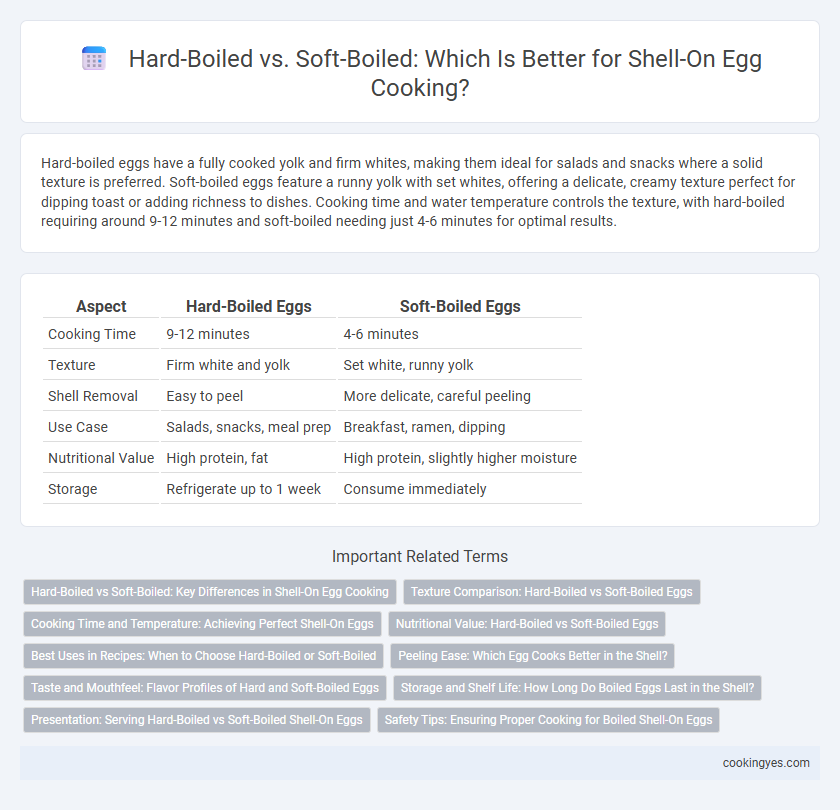Hard-boiled eggs have a fully cooked yolk and firm whites, making them ideal for salads and snacks where a solid texture is preferred. Soft-boiled eggs feature a runny yolk with set whites, offering a delicate, creamy texture perfect for dipping toast or adding richness to dishes. Cooking time and water temperature controls the texture, with hard-boiled requiring around 9-12 minutes and soft-boiled needing just 4-6 minutes for optimal results.
Table of Comparison
| Aspect | Hard-Boiled Eggs | Soft-Boiled Eggs |
|---|---|---|
| Cooking Time | 9-12 minutes | 4-6 minutes |
| Texture | Firm white and yolk | Set white, runny yolk |
| Shell Removal | Easy to peel | More delicate, careful peeling |
| Use Case | Salads, snacks, meal prep | Breakfast, ramen, dipping |
| Nutritional Value | High protein, fat | High protein, slightly higher moisture |
| Storage | Refrigerate up to 1 week | Consume immediately |
Hard-Boiled vs Soft-Boiled: Key Differences in Shell-On Egg Cooking
Hard-boiled eggs are cooked in their shells for 9 to 12 minutes, resulting in a fully set white and firm yolk, while soft-boiled eggs cook for 4 to 6 minutes, yielding a tender white and runny yolk. Shell-on cooking preserves the egg's natural moisture and prevents cracking by regulating heat penetration time, which is crucial for achieving the desired internal texture. The protein structure and moisture content in hard-boiled eggs differ significantly from soft-boiled eggs, influencing taste and nutritional retention during cooking.
Texture Comparison: Hard-Boiled vs Soft-Boiled Eggs
Hard-boiled eggs have a firm, fully set white and yolk with a dense, crumbly texture ideal for slicing or dicing in salads, while soft-boiled eggs feature a tender, slightly runny yolk and a delicately cooked white that offers a creamy mouthfeel. The contrast in texture is primarily due to the cooking time and temperature, with hard-boiled eggs cooked for 9-12 minutes and soft-boiled eggs for 4-6 minutes. This difference makes hard-boiled eggs more suitable for recipes requiring solid structure, whereas soft-boiled eggs excel in dishes emphasizing a rich, velvety consistency.
Cooking Time and Temperature: Achieving Perfect Shell-On Eggs
Hard-boiled eggs require boiling water at 100degC for 9-12 minutes to achieve firm whites and fully set yolks, while soft-boiled eggs typically need 4-6 minutes to maintain a runny yolk with slightly set whites. Precise timing combined with immediate ice bath cooling ensures ideal texture and prevents overcooking or shell cracking. Controlling water temperature and cooking time is critical for consistently perfect shell-on eggs tailored to desired firmness.
Nutritional Value: Hard-Boiled vs Soft-Boiled Eggs
Hard-boiled eggs maintain their nutritional profile with slightly reduced vitamin content due to longer cooking times, preserving high protein levels and minerals like iron and selenium. Soft-boiled eggs retain more water-soluble vitamins such as B-complex and antioxidants, offering enhanced nutrient bioavailability while maintaining a creamy texture. Both methods provide essential amino acids and healthy fats, but soft-boiled eggs deliver higher levels of heat-sensitive nutrients, benefiting overall nutritional intake.
Best Uses in Recipes: When to Choose Hard-Boiled or Soft-Boiled
Hard-boiled eggs, cooked for 9-12 minutes, offer a firm yolk ideal for salads, deviled eggs, and egg sandwiches due to their sturdy texture and easy slicing. Soft-boiled eggs, with a cooking time of 4-6 minutes, feature a runny yolk perfect for dipping toast soldiers, adding richness to ramen, or garnishing green salads. Choosing between hard-boiled and soft-boiled depends on desired texture and incorporation, with hard-boiled providing structure and soft-boiled delivering creamy, molten centers.
Peeling Ease: Which Egg Cooks Better in the Shell?
Hard-boiled eggs develop a firmer whites and yolks, making them generally easier to peel when cooked properly and quickly cooled in ice water. Soft-boiled eggs have a more delicate, semi-liquid yolk and tender whites, which can cause the shell to stick more during peeling. For shell-on cooking, hard-boiled eggs are preferred for ease of peeling due to the solidified interior creating a clear separation between the membrane and shell.
Taste and Mouthfeel: Flavor Profiles of Hard and Soft-Boiled Eggs
Hard-boiled eggs offer a firmer texture with a dense, chalky yolk and a mild, savory flavor that intensifies with cooking time. Soft-boiled eggs feature a creamy, runny yolk and tender whites, delivering a richer, more buttery taste that enhances the overall mouthfeel. The contrast in texture directly influences the flavor perception, making hard-boiled eggs suited for hearty bites while soft-boiled eggs provide a delicate, smooth eating experience.
Storage and Shelf Life: How Long Do Boiled Eggs Last in the Shell?
Hard-boiled eggs in the shell can last up to one week in the refrigerator, maintaining safety and quality whether cooked soft or hard. Soft-boiled eggs have a shorter shelf life due to their partially cooked yolk, making them more perishable than fully hard-boiled eggs. Proper refrigeration at or below 40degF (4degC) and storing eggs in a covered container significantly extends their freshness and reduces the risk of bacterial contamination.
Presentation: Serving Hard-Boiled vs Soft-Boiled Shell-On Eggs
Hard-boiled shell-on eggs offer a firm, solid texture that holds its shape perfectly, making them ideal for slicing or dicing in salads or garnishes. Soft-boiled eggs, with their delicate, runny yolk and slightly set whites, provide a visually appealing contrast when served in egg cups or halved, highlighting the rich, creamy center. Serving soft-boiled eggs immediately after cooking enhances their tender presentation, while hard-boiled eggs can be chilled for a neat, clean appearance on platters.
Safety Tips: Ensuring Proper Cooking for Boiled Shell-On Eggs
To ensure safety when cooking shell-on eggs, it is crucial to reach the proper internal temperature: 160degF (71degC) for hard-boiled eggs and 145degF (63degC) for soft-boiled eggs, minimizing the risk of Salmonella. Using a precise timer and simmering eggs gently helps maintain consistent cooking, reducing the chance of undercooked interiors. Cooling eggs immediately in ice water after boiling halts cooking and prevents bacterial growth on the shell surface.
Hard-boiled vs Soft-boiled for Shell-on Egg Cooking Infographic

 cookingyes.com
cookingyes.com